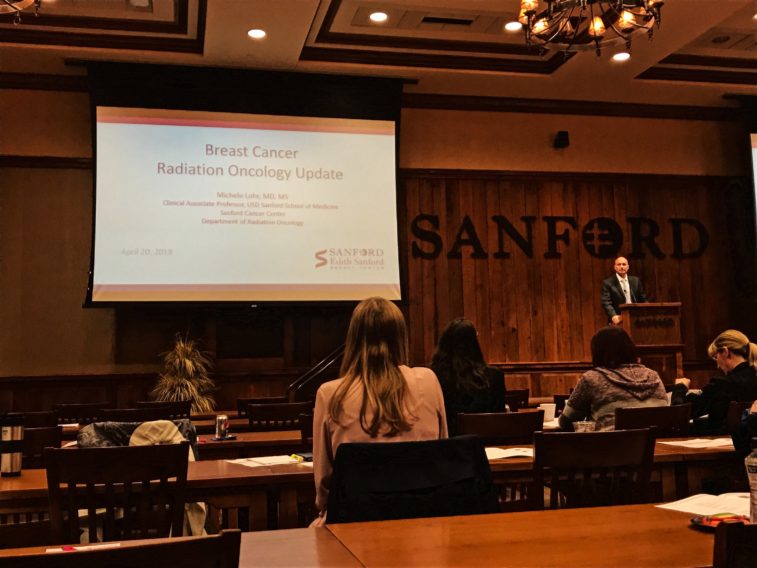Sanford Health shared its advances in breast cancer research and treatments during the Edith Sanford Breast Center Symposium on April 20.
Employees, health care professionals, students and others interested in learning more about breast health attended to hear from Sanford Health experts on the latest updates.
The symposium featured eight speakers and a range of topics:
- The aspects of cancer survivorship care
- The impact of genomics on breast cancer
- The concerns and clarifications of cancer diets
- The progress of immunotherapy
- The importance of breast cancer staging
- The update in technological advancements
- The identification and characterization of novel biomarkers and drug targets
Sanford Health also brought in outside speakers to share efforts, expertise and knowledge in the advancements of breast cancer.
Impact of genetics
Among the outside guests was James Ford, M.D., FACSO, a professor of medicine and genetics at the Stanford University School of Medicine.
Dr. Ford presented information on the value of genomics, as well as a new class of drugs called PARP poly (ADP ribose) polymerase inhibitors and how they benefit those who may be at a risk with breast cancer.
“In the last decade, the technical advances in genomics, and for that I just mean how to sequence DNA, have advanced so much that in the cost of doing that have come down so much that we can apply this to real world health care for cancer in general,” Ford said.
This especially benefits both women at risk for breast cancer, and women who have had breast cancer.
“Now in a matter of weeks, and for the cost of less than a CT scan, you can get a genetic test to figure out if you have a family risk for breast cancer or a tumor test to try and help treat it,” Ford said.
Less is more
Along with advances in technology, DNA related testing and other innovations impacting breast cancer, guests learned about new techniques regarding breast surgery from Jesse Dirksen, M.D., FACS, the surgical director at the Edith Sanford Breast Center.
“In the surgery world, breast surgery and lymph node surgery are becoming less invasive,” Dirksen said.
He described how in some cases, less surgery is actually more beneficial for patients.
“We’re doing less and less lymph node removal, which is lowering the rates of lymphedema,” Dirksen said. “In terms of breast surgery, we are doing more lumpectomies and when a mastectomy is needed, we have some great cosmetic outcomes for the patients. Our reconstructive options are really improving, and the cosmetic aspects of breast cancer surgery are rapidly improving.”
…
